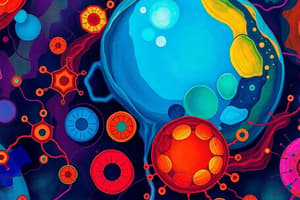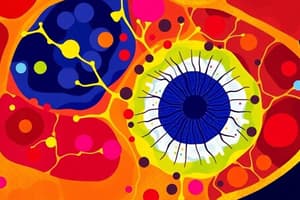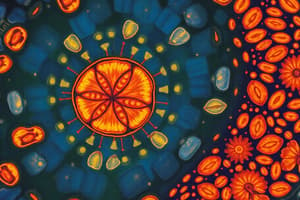Podcast
Questions and Answers
What is the primary function of the nucleus in a cell?
What is the primary function of the nucleus in a cell?
- Energy production
- Control of cell activities and housing genetic material (correct)
- Protein synthesis
- Waste digestion
Which of the following structures is involved in cellular respiration?
Which of the following structures is involved in cellular respiration?
- Mitochondria (correct)
- Lysosomes
- Endoplasmic Reticulum
- Golgi Apparatus
Which process results in two identical daughter cells?
Which process results in two identical daughter cells?
- Cell signalling
- Mitosis (correct)
- Cytokinesis
- Meiosis
What distinguishes rough ER from smooth ER?
What distinguishes rough ER from smooth ER?
What role do lysosomes play in the cell?
What role do lysosomes play in the cell?
In what type of cell signaling do cells respond to signals they secrete themselves?
In what type of cell signaling do cells respond to signals they secrete themselves?
Which organelle is responsible for modifying, sorting, and packaging proteins?
Which organelle is responsible for modifying, sorting, and packaging proteins?
What describes the function of the cytoskeleton?
What describes the function of the cytoskeleton?
What is the defining characteristic of prokaryotic cells?
What is the defining characteristic of prokaryotic cells?
Which metabolic pathway breaks down glucose to produce energy?
Which metabolic pathway breaks down glucose to produce energy?
Flashcards are hidden until you start studying
Study Notes
Cell Biology Study Notes for PCMB 11 and 12
Key Concepts
-
Cell Theory
- All living organisms are composed of cells.
- Cells are the basic unit of life.
- All cells arise from pre-existing cells.
-
Cell Structure
- Prokaryotic Cells: Lack a nucleus; DNA is in the nucleoid region.
- Examples: Bacteria and Archaea.
- Eukaryotic Cells: Have a nucleus; more complex structures.
- Features: Membrane-bound organelles (mitochondria, endoplasmic reticulum).
- Prokaryotic Cells: Lack a nucleus; DNA is in the nucleoid region.
-
Cell Membrane
- Composed of phospholipid bilayer.
- Proteins embedded for transport and signaling.
- Semi-permeable; regulates entry and exit of substances.
Organelles and Their Functions
-
Nucleus
- Controls cell activities; houses genetic material (DNA).
-
Mitochondria
- Powerhouse of the cell; site of ATP (energy) production through cellular respiration.
-
Endoplasmic Reticulum (ER)
- Rough ER: Studded with ribosomes; synthesizes proteins.
- Smooth ER: Lacks ribosomes; synthesizes lipids, detoxifies substances.
-
Golgi Apparatus
- Modifies, sorts, and packages proteins and lipids for secretion or use within the cell.
-
Lysosomes
- Contains enzymes for digestion of macromolecules; involved in waste removal.
-
Ribosomes
- Sites of protein synthesis; can be free in the cytoplasm or attached to the ER.
-
Cytoskeleton
- Structure and support for the cell; involved in intracellular transport and cell division.
- Composed of microfilaments, intermediate filaments, and microtubules.
Cell Division
-
Mitosis
- Process of somatic cell division; results in two identical daughter cells.
- Stages: Prophase, Metaphase, Anaphase, Telophase.
-
Meiosis
- Process of gamete formation; results in four genetically diverse daughter cells.
- Two stages: Meiosis I and Meiosis II.
Cellular Metabolism
-
Metabolism Overview
- The sum of all chemical reactions in a cell; includes anabolic (building) and catabolic (breaking down) pathways.
-
Ex. of Metabolic Pathways
- Glycolysis: Breakdown of glucose to produce energy.
- Krebs Cycle: Produces electron carriers for the electron transport chain.
Cellular Communication
-
Signal Transduction Pathways
- Mechanisms by which cells respond to signals from the environment.
- Involves receptors, second messengers, and cellular responses.
-
Types of Cell Signaling
- Autocrine: Cells respond to signals they secrete.
- Paracrine: Signals act on neighboring cells.
- Endocrine: Hormonal signals travel through the bloodstream.
Additional Concepts
-
Cell Cycle Regulation
- Checkpoints ensure proper progression; dysfunction can lead to cancer.
-
Apoptosis
- Programmed cell death; crucial for development and maintaining cellular health.
-
Stem Cells
- Undifferentiated cells with the potential to develop into various cell types; important for regeneration and repair.
These notes encapsulate essential components of cell biology relevant to PCMB 11 and 12, emphasizing structure, function, processes, and regulation within cells.
Cell Theory
- All living organisms are made of cells.
- Cells are the fundamental unit of life.
- Cells arise from pre-existing cells.
Cell Types
- Prokaryotic cells: Lack a nucleus; DNA is in the nucleoid; examples include bacteria and archaea.
- Eukaryotic cells: Possess a membrane-bound nucleus and complex organelles; examples include animal and plant cells.
Cell Membrane
- Phospholipid bilayer structure.
- Embedded proteins facilitate transport and signaling.
- Selectively permeable, controlling substance passage.
Organelles & Functions
- Nucleus: Houses DNA; controls cell activities.
- Mitochondria: ATP production via cellular respiration; the "powerhouse" of the cell.
- Endoplasmic Reticulum (ER):
- Rough ER: Protein synthesis (ribosome-studded).
- Smooth ER: Lipid synthesis and detoxification.
- Golgi Apparatus: Protein and lipid modification, sorting, and packaging.
- Lysosomes: Contain digestive enzymes; involved in waste breakdown.
- Ribosomes: Protein synthesis; found free in cytoplasm or bound to ER.
- Cytoskeleton: Provides structural support; aids in intracellular transport and cell division; composed of microtubules, microfilaments, and intermediate filaments.
Cell Division
- Mitosis: Somatic cell division; produces two genetically identical daughter cells. Stages include prophase, metaphase, anaphase, and telophase.
- Meiosis: Gamete (sex cell) formation; yields four genetically diverse daughter cells. Involves two divisions: Meiosis I and Meiosis II.
Cellular Metabolism
- Metabolism: All chemical reactions within a cell; encompasses anabolic (building) and catabolic (breaking down) pathways.
- Examples: Glycolysis (glucose breakdown); Krebs cycle (generates electron carriers for the electron transport chain).
Cellular Communication
- Signal Transduction: Mechanisms enabling cellular responses to environmental signals; involves receptors, second messengers, and downstream effects.
- Signal Types:
- Autocrine: Cell responds to its own signals.
- Paracrine: Signals affect nearby cells.
- Endocrine: Hormones travel via the bloodstream.
Additional Concepts
- Cell Cycle Regulation: Checkpoints ensure orderly progression; malfunctions can cause cancer.
- Apoptosis: Programmed cell death; essential for development and maintaining cellular health.
- Stem Cells: Undifferentiated cells capable of differentiating into various cell types; crucial for tissue repair and regeneration.
Studying That Suits You
Use AI to generate personalized quizzes and flashcards to suit your learning preferences.




